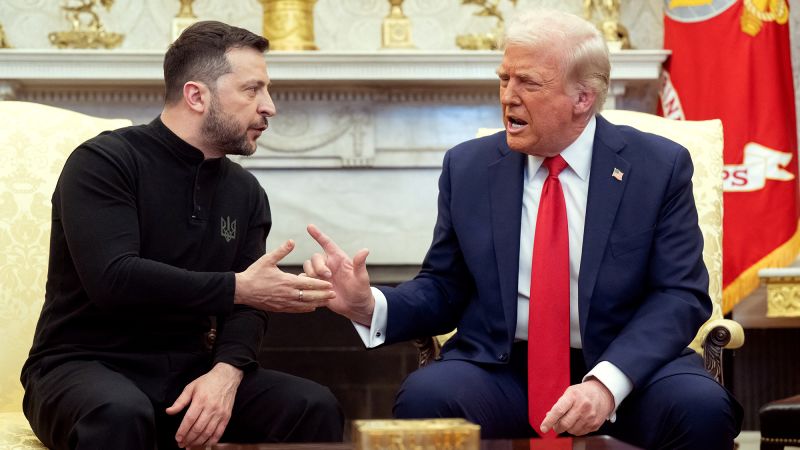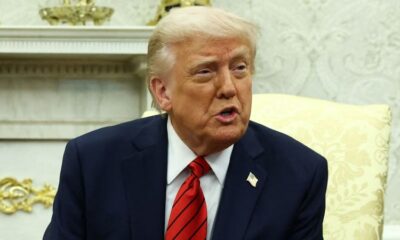CNN
—
Americans are skeptical that President Donald Trump’s approach to the war between Russia and Ukraine will bring peace to the region, according to a new CNN poll conducted by SSRS. Most Americans view Trump’s handling of the conflict negatively, and 50% say his approach to the war is bad for the United States.
US diplomats are currently working to persuade Russia to agree to a temporary ceasefire in the war that has dragged on for more than three years since Russia’s invasion. While the Biden administration strongly backed Ukraine and unambiguously blamed Russia for the conflict, Trump has blamed Ukraine for causing the war and called Ukrainian President Volodymyr Zelensky a dictator, drawing complaints from European allies and domestic critics.
CNN’s latest poll finds that 59% of Americans think it’s not too likely or not at all likely that Trump’s approach will bring long-term peace between Russia and Ukraine, while 41% say it’s at least somewhat likely. More broadly, nearly 6 in 10 Americans disapprove of Trump’s handling of the US relationship with Russia (59%), and 55% disapprove of his handling of the situation in Ukraine.
Half of Americans think that Trump’s approach to the war between Russia and Ukraine is bad for the US, compared to only 29% who think it’s good for the US (20% say it does not make a difference). This mirrors Americans’ broader views of Trump’s foreign policy moves so far in his second term: while 30% say his decisions have helped America’s standing in the world, more than half (54%) say that they’ve hurt America’s standing.
A sizable share of Republicans express doubts about Trump’s approach to foreign policy, including 15% who see his foreign policy decisions as having hurt America’s standing in the world, 18% who say his approach to the war between Russia and Ukraine is bad for the US and 28% who believe his approach is unlikely to result in long-term peace between the two countries. Democrats are more unified around negative views of Trump’s foreign policy choices.
A broad majority of Americans view Ukraine as either an ally or friendly to the US (72%) and Russia as either unfriendly or an enemy to the US (81%). The share that considers Ukraine to be an ally has climbed 7 points since 2014, just after Russia’s annexation of Crimea. Negative views of Russia have also changed since then, with the share describing Russia as an enemy climbing from 25% in May 2014 to 41% by 2018 and 44% now.
Americans are closely split on whether the US is doing too much (32%), too little (38%) or the right amount (30%) for Ukraine in its war with Russia. In January 2024, 30% of Americans said the US was doing too little for Ukraine.
The public’s view of Trump’s handling of the war breaks sharply along partisan lines, with 84% of Republicans approving of how Trump is handling the situation in Ukraine compared with just 10% of Democrats. Nearly two-thirds of Democrats say the US is doing too little to help Ukraine in its war with Russia, while roughly half of Republicans say the US is doing too much.
Democrats and Republicans also differ in how they view the two countries. Democrats are more likely than Republicans to view Ukraine as at least friendly (82% of Democrats say so, compared with 64% of Republicans) and to view Russia as an enemy (54%, compared with 36% for Republicans).

In the aftermath of a highly publicized confrontation in the Oval Office between Zelensky, Trump and Vice President JD Vance, Americans are more likely to view Zelensky positively than negatively (39% to 33%, with 28% expressing no opinion). Roughly two-thirds of Democrats view Zelensky positively, and 63% of Republicans view him negatively. The poll finds both Trump and Vance with net negative favorability ratings overall (42% favorable to 52% unfavorable for Trump, 33% to 44% for Vance).
The poll also finds a majority of Americans with negative views towards Trump’s broader approach to international relations. Nearly 6 in 10 Americans say they disapprove of his handling of foreign affairs, while 54% say that Trump is not an effective world leader and 56% say that Trump’s cuts to federal programs will hurt the nation’s standing in the world (compared to 28% who say the cuts will help, and 15% saying they will neither help nor hurt).
This assessment of Trump’s handling of foreign affairs comes amid a chaotic start to his second term: since the election in November, Trump has threatened to seize territories from allies, frozen foreign aid programs (resulting in intensifying humanitarian crises), announced a wide range of tariffs (including some targeting the United States’ largest trading partners, Canada and Mexico), cut off military aid and intelligence sharing to Ukraine in the aftermath of the Oval Office meeting with Zelensky, and suggested a plan to displace all Palestinians from Gaza.
Americans are split on whether the US should take a leading role in solving international problems (51% say it should and 49% say it should not). This cuts across party lines, with 58% of Democrats and Democratic-leaning independents, and 50% of Republicans and Republican-leaners saying that the US should take a leading role. This is a reversal from the past: in 2015, only 37% of Democrats and Democratic-leaning independents said they wanted the country to take a leading role and a slim majority, 54%, of Republican-aligned adults said the same.
The poll also finds Americans’ views toward other nations shifting, as fewer see a deep connection to the US’s traditional European allies, and unfriendly sentiments about Canada and Mexico are on the rise.
American sentiment towards traditional European allies tested in the poll has dropped uniformly since August 2018. Just 58% now describe Great Britain as an ally, down from 66% in 2018. That figure has dropped from 49% to 39% for Germany, and from 56% to 45% for France. Americans are also more likely to view Mexico and Canada negatively compared to the past – only about half of Americans call Canada an ally now (that has been as high as 65% in a 2000 CNN poll) and only 25% feel that way toward Mexico (40% felt that way in 2000).
Americans’ views of Israel have also shifted somewhat more negative. While 73% call Israel an ally or friendly, similar to the 75% who felt that way in 2018, the 27% who describe it as unfriendly or an enemy is the highest share to say so in CNN polling back to 2000.
Across the countries tested in the poll, respondents are most likely to rate Iran as unfriendly to or an enemy of the United States (88%), followed by North Korea (85%), Russia (81%), and China (74%). Respondents split on their views of Saudi Arabia, with 50% describing it as an ally or friendly and 49% saying it is unfriendly or an enemy.
The poll also finds continued deterioration in American’s views of China. In 2011, 62% of Americans viewed China as an ally or friendly to the US, which declined to 45% in 2018 and 25% in CNN’s most recent poll.
Americans’ generally warm views of Ukraine and Israel don’t always translate to a desire for the US to support their war efforts. A quarter of those who view Ukraine as at least friendly say that the US is doing too much to help the nation in its war with Russia, and 29% of Americans who view Israel as at least friendly say that the US is providing too much assistance to the nation in its war with Hamas.
Overall, 34% say that the US is doing too much for Israel in its war against Hamas, with 47% saying the US is doing the right amount and 19% too little. In January 2024, 29% said the US was doing too little for Israel.
The CNN poll was conducted by SSRS from March 6-9 among a random national sample of 1,206 US adults drawn from a probability-based panel. Surveys were either conducted online or by telephone with a live interviewer. Results among all adults have a margin of sampling error of ±3.3 percentage points.
CNN’s Ariel Edwards-Levy and Jennifer Agiesta contributed to this report.






















